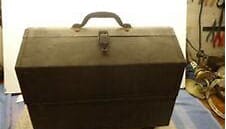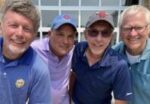
ubi amor ibi oculus
Years ago, when my father and I were renovating my first house, we ran into a snag.
We had torn apart most of the interior walls and were replacing 70-year-old wiring with new romex. If I recall, our problem involved getting the new cable to stay in place above an unexposed joist long enough for us to move it where it really belonged.
Frustrated, my father asked if I had a box of stuff.
As I was to learn, every do-it-yourselfer needs such a box. It’s where you keep the oddball pieces and parts you can codge together when actual hardware won’t work. It might be a bent nail, a straightened paper clip, some twine, loose nuts and bolts or a dead flashlight battery.
You sort with a finger, pushing other stuff aside while searching for inspiration.
I’m in a newer house these days and my home repairs are less frustrating. I have an actual basement workshop area with screws in plastic drawers, sorted by length. If I need a thumbtack or an X-acto replacement blade, I know where to look. Still, I keep a box nearby for stuff that doesn’t fit any known category.
When I see that box, I often remember Lester Bennett, one of the favorite people I met during 33 years of writing newspaper stories.
I met Lester sometime during the late 1990s when my career as a newspaper writer was on a steep downward slope. Up until then, I had been something of a rising star at our paper. I knew how to find a story and how to write it. I won some awards and had earned some promotions.
New management showed up, and everything changed. It happens in a lot of companies to a lot of people, so I won’t whine about it. But the stumble from the top to the bottom is especially fast when you don’t see it coming. Ultimately, my new job became doing work no one else wanted to do.
It was during this time that Lester called. He had received the telephone brush-off from four editors before my phone rang. His story was this: He had been digging a new garden in his backyard and had unearthed some stones that would prove our ancestors had come from ancient Egypt.
It was a slow news day, so I asked for his address and told him I would be there in 10 minutes.
I’ve written about my time with Lester before, for the Notre Dame student newspaper, so some of this may be familiar. In that column, I described him as stooped-over older man with crazy Albert Einstein hair. As I said then and repeat now, his gray pants were caked at the knees with dirt the color of dead squirrels. He shook my hand gently with fingers that seemed lifeless and swollen.
We stood at first in the shade of his porch as he gave me the bare-bones history of his life. He had grown up in this very neighborhood. He remembered walking to grade school past an old quarry that has since been filled with dirt and populated with small houses. He had met his wife at a church dance. He wished I could meet her but she had died six or seven months earlier, having been bedridden for the last 10 years of her life.
After she died, he began to dig a garden in the backyard, mainly for something to do. The ground there was hard with dense black soil. It was a long project because he could only dig a little at a time. Once he cut through the black stuff, he had found a reddish-gray lower layer that contained a wide variety of small stones.
Each time his shovel moved through this subsoil, more pebbles came to the surface. At first, he just piled them alongside the trench where he intended to plant potatoes. But one of the stones caught his eye. He stopped his digging so he could give the stones a closer look.
At that point in his story-telling, Lester reached into his jacket pocket. He brought out a handkerchief, which he unwrapped to reveal some soft tissue paper. He then used a fingernail to peel back the tissue to show me the stones he had found.
First, he gave me his magic black stone. It was smooth, the size of a grape. In all his digging, he had found no other stone in the garden like it. I was the first person, other than him, to hold it.
“Feel it?” he asked. “No matter how long you hold it, it stays cold. It can’t get warm.”
He was right. On this warm day, it was a cold stone.
He had four or five other stones in his little packet. A couple were about the size of postage stamps. They had unusual ridges on them. Lester pulled out small magnifying glass so I could get a better look. “Those are letters,” he said. “I can’t read them because I don’t know their language.”
His largest stone, about the size of a baseball card, had an intricate pattern of grooves. He turned it 90 degrees because I was looking at it wrong. “Doesn’t that look like a group of dancing girls?” he asked. “I think it’s a piece off of something a lot bigger. I would like to find someone to help me dig the rest of it up.”
I looked at the dancing-girl stone and I looked at Lester with his wild Einstein hair. The words that came to my mind were ancient and seemed like gibberish: “Ubi amor ibi oculus.”
It’s a Latin phrase that I had read on the blackboard of a philosophy classroom in O’Shaughnessy Hall three times a week during the first semester of my junior year at Notre Dame. As I recall, Professor Joe Evans wrote those words anew each time I attended his class.
There were legendary professors on the campus then. Joe Evans was said to be among them. I had seen him on benches outside O’Shag, an odd-looking fellow with a dull brown suit and a red bowtie. He always was alone, seemingly deep in thought.
On the first day of class, Professor Evans wrote “ubi amor ibi oculus” on the board. He elaborately spoke each word, followed by the English translation – “to love is to see and,” with a long pause, “to see is to love.”
The phrase seemed to mean a lot to him but almost nothing to me. He spoke of other long-dead writers, like Jacques Maritain and Thomas Aquinas, as if they were neighbors of his, but he always returned to his “ubi amor ibi oculus.”
I never missed a class, but I felt like I wasn’t learning a thing. “Ubi amor ibi oculus.” The only thing it meant to me was that I was getting my three credits toward graduation.
But then, at his final lecture of the semester, he said all the same things he had been saying in the previous 30-some classes. Something about it struck me. I couldn’t move my pen fast enough to record the insights I was receiving. I don’t know how he did it and I can’t explain it, but it was as if he had hammered a seed into my heart.
I am not a Notre Dame zealot. My older brothers learned equally well at Purdue and Michigan State, my son and daughter at Ball State, my golf buddies at Indiana University. You don’t become a better accountant just because you took your classes at Notre Dame instead of Bloomington. Numbers are numbers, no matter where you go.
But I do think that a lot of us at that place and in that time, if we were lucky, ended up in a classroom where we didn’t think we belonged and we learned something that wasn’t on the blackboard.
We moved on with our lives with some of those heart seedlings, whether they came from a snippet of Scripture, a chance comment from a university legend like Father Hesburgh or from a final lecture by Professor Evans. They remind us there are moments when we can stop measuring our lives by our awards and promotions and bonuses.
Joe Evans, in my father’s words, had become part of my box of stuff.
He helped me see what Lester saw and appreciate it. But there were other pieces and parts in my box as well. One of my best friends had just gone through a liver transplant and died. My father was fighting a losing battle with colon cancer. I think I understood why Lester went out one day and started digging a garden.
I ended up writing a story different from the one he expected. It wasn’t about amazing stones, Egypt or dancing girls. It was more about a man approaching the end of his days, hoping that there was something splendid and magical still out there. The story didn’t win any awards. I think it ran on Page D6 in one edition. One of the other editors saw it, liked something about it and ran it on D1 in a different edition. It had something of a brief cult following among those in the newsroom who treasured writing, and that was that.
Professor Evans’ lesson, for me, is that we have an opportunity when we run across people like Lester. We can do the usual stoplight glance and decide that he was a crazy old fool. Or we can choose to “amor” and “oculus,” to love and see, to see and to love. The reward may be that we understand ourselves better when we get to that same place, with our own Einstein hair.
Our lives should be more than a total of what we’ve done. When our adventures are ending and we’re in our own little garden, we too will yearn for signs that our lives are still splendid and magical.
We’ll have to dig where we are, deeper, and we’ll want someone to help. If fate smiles on us, what we need might be there in our box of stuff.
